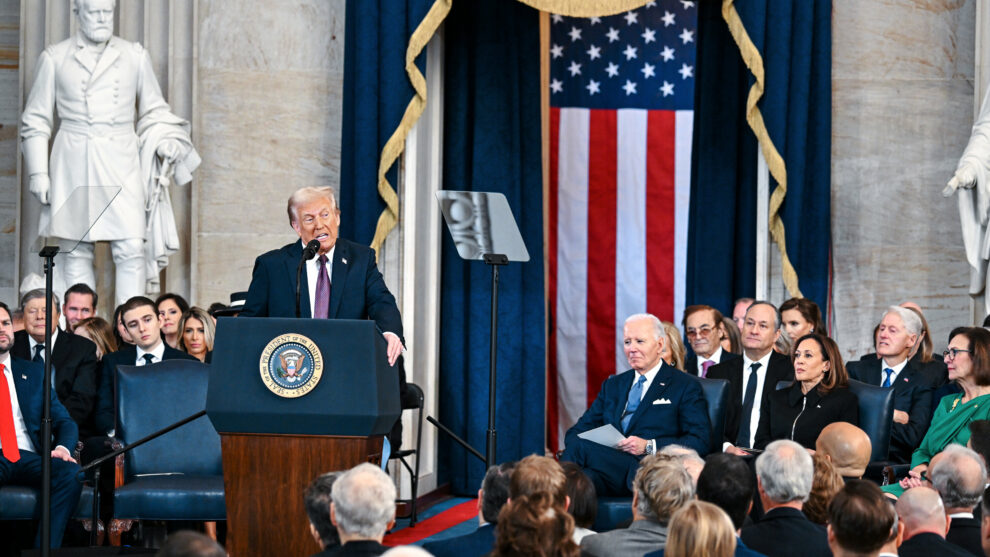President Donald Trump wasted no time on his first day back in office, signing an executive order aimed at protecting Americans’ free speech from what he perceives as unconstitutional government censorship. The move, which comes just hours after his inauguration for a second term, is a significant step towards fulfilling his campaign promise to dismantle what he calls the “censorship cartel.”
The executive order, signed onstage at the Capital One Arena alongside a series of other actions, prohibits federal officers, employees, and agents from unconstitutionally abridging the free speech of any American citizen. It also directs the attorney general, in consultation with other executive agency heads, to investigate potential infringements on free speech by the federal government during the Biden administration and propose “remedial actions” based on the findings.
Trump’s action resonates with his supporters, many of whom believe that the federal government has unfairly targeted lawful speech from right-wing voices. This sentiment has been echoed by prominent tech figures, such as Meta CEO Mark Zuckerberg, who recently accused senior Biden administration officials of pressuring his employees to inappropriately “censor” content during the COVID-19 pandemic. Similarly, Elon Musk, the owner of the social platform X, has alleged that the FBI illegally coerced Twitter to suppress a story about Hunter Biden before his tenure.
While former Twitter executives have acknowledged their mistake in blocking the story just before the 2020 presidential election, they have vehemently denied acting under government pressure. The Supreme Court also sided with the Biden administration last year in a dispute with Republican-led states over the federal government’s role in combating controversial social media posts related to COVID-19 and election security.
Critics argue that Trump’s executive order fails to address the severity of harmful online falsehoods, which have increasingly led to real-world threats, harassment, and targeted violence. The attack on the U.S. Capitol four years ago, fueled by Trump’s own torrent of lies about the 2020 election, stands as a stark reminder of the potential consequences of unchecked misinformation.
The impact of the order on the work of various U.S. agencies tasked with tracking false claims that pose threats to election security, such as the FBI, the Office of the Director of National Intelligence, and the U.S. Cybersecurity and Infrastructure Security Agency (CISA), remains unclear. CISA, in particular, has faced criticism from Republicans for its efforts to counter misinformation, with Trump’s pick to head the Department of Homeland Security, South Dakota Gov. Kristi Noem, expressing a willingness to rein in the agency’s work if federal lawmakers demand it.
Outgoing CISA Director Jen Easterly has defended the agency’s work, asserting that it “does not censor, has never censored.” Nina Jankowicz, the CEO of the American Sunlight Project and former head of a short-lived federal Disinformation Governance Board, criticized Trump’s order, stating that it “seeks vengeance for a slight that never happened” and emboldens foreign actors who use disinformation to destabilize the country and profit from lies.
While Trump’s order focuses on Americans’ speech, its influence on how federal agencies communicate with social media companies about false claims originating from abroad remains to be seen. Many disinformation campaigns targeting U.S. voters are promoted online by American citizens, further complicating the issue.
Despite styling himself as a champion of free expression, Trump has a contentious history with the press, often referring to journalists as the “enemy of the people” and threatening retribution against the news media in his second term. However, he has recently fostered relationships with the tech billionaires who run the platforms where Americans communicate, giving prime seats at his inauguration to Elon Musk, Mark Zuckerberg, and Sundar Pichai, and taking credit for the return of TikTok in the U.S.
As the implications of Trump’s executive order unfold, the nation will closely watch how the administration navigates the delicate balance between protecting free speech and combating the spread of harmful misinformation. The outcome of this endeavor will have far-reaching consequences for the future of American discourse and the role of government in regulating online speech.
















Add Comment